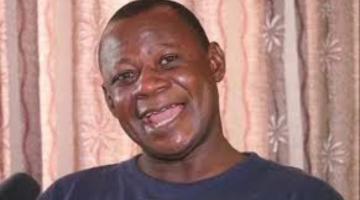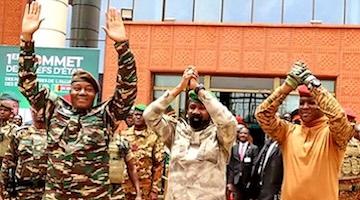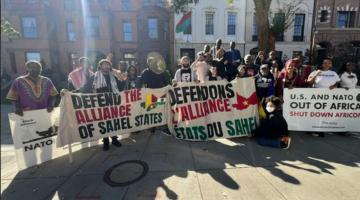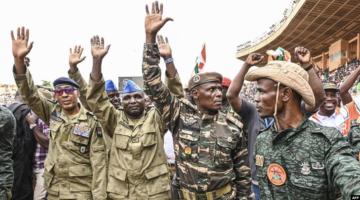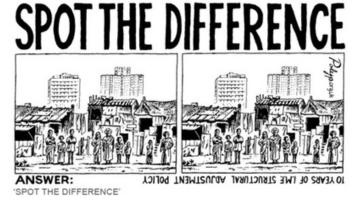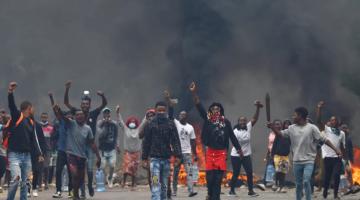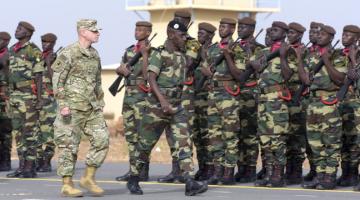Youth pose behind a Mozambique flag while in the street during a demonstration, courtesy apanews.net.
Mozambique is experiencing a period of unrest provoked by recent elections. After unending suffering under neoliberal austerity measures and the encroachment of AFRICOM, the Mozambican people have taken to the streets. The Black Alliance for Peace's US Out of Africa Network (USOAN) spoke to Ebubechukwu Nwafor about the situation.
Originally published in Black Alliance for Peace.
The post-election turmoil in Mozambique highlights the deeply embedded contradictions of U.S. imperialism in Africa. While AFRICOM and its allies claim to support “stability” and “peacebuilding,” the reality on the ground paints a different picture: a nation wracked by deepening inequality, state repression, and the unchecked plundering of its natural resources by Western multinationals. AFRICOM’s growing presence in Mozambique under the guise of “counterterrorism” coincides with the entrenchment of foreign military influence and neoliberal policies that strip the Mozambican people of their sovereignty.
This is no coincidence. AFRICOM’s mission serves to integrate African militaries into the U.S. empire, ensuring they act as enforcers of Western interests while perpetuating a state of dependency and instability. In Mozambique, as in the Sahel and beyond, we see how the facade of counterterrorism and peace masks a more insidious goal: securing unfettered access to Africa’s resources while silencing resistance.
In this issue, we speak with a Mozambican organizer about the ongoing uprisings, the people’s fight against exploitation and repression, and how imperialist actors manipulate legitimate grievances to serve their agenda. These struggles illuminate the urgent need for international pan-African solidarity!
U.S. Out of Africa: Voices from the Struggle
AFRICOM Watch Bulletin spoke with Ebubechukwu Nwafor, who is an artist and organiser with the All-African People's Revolutionary Party based in Mozambique.
AFRICOM Watch Bulletin: The Mozambique elections just happened and there has been an upsurge of violence post-election. Can you speak to what the nature of these tensions are and the struggle going on in Mozambique right now?
Ebubechukwu Nwafor: The rising tensions we are seeing in Mozambique do not only stem from accusations of electoral fraud, though this has been an explosive catalyst for the protests. Victims of an increasingly neo-liberal economic agenda, the Mozambican people have grown tired of leaders who continue to sell our sovereignty to western multinationals while conditions deteriorate for the masses of people. Following the death of popular activist-rapper, Azagaia, in March last year, many young people took to the streets to commemorate his life, chanting “povo no poder” (power to the people) as he often did in his music, drawing from the words of Samora Machel. This was a defining moment for Mozambican youth.
As a result of the heavy police repression during those processions, people came to understand that the government will repress popular dissent using any means at their disposal, including assassinations, as we saw in the case of the murders of Paulo Guambe and Elvino Dias this October. Guambe and Dias were opposition party figures from the PODEMOS party, who were working to present a case to the Constitutional Council challenging the election results that granted victory to FRELIMO’s candidate Daniel Chapo at the time of their assassination. The government’s use of death squads to silence dissent is not new in Mozambique. And neither is election violence. However, the scale of the people’s response to state violence and accusations of election-rigging this year is larger than we have ever seen. These accusations, combined with the assassinations of Guambe and Dias have further fueled the masses’ anger and pushed them to the streets in protest.
Venâncio Mondlane, the main opposition candidate, backed by many young voters who have grown disillusioned with the increasingly neo-liberal FRELIMO Party, directs the protests using Facebook Live after fleeing the country fearing for his safety. Mondlane is backed by PODEMOS, a party comprised of break-away FRELIMO dissidents. Mondlane has met with far-right figures in Europe and back in 2013, took part in the U.S. State Department’s International Visitor Leadership Programme. He tows the neo-liberal line and is not an anti-imperialist by any means. But he marks himself as anti-corruption and is not a member of the ruling party, so he attracts followers. Imperialist financial institutions have a hand in fomenting this crisis. Structural adjustment programmes implemented by the IMF following Samora Machel’s assassination in 1986 crippled the nascent public sector and led to FRELIMO abandoning its socialist project. Again in 2016, after the “tuna bond” corruption scandal that rocked FRELIMO’s leadership was revealed, the IMF pulled funding. Consequently, the government defunded essential sectors like health and education which has affected the most marginalized in Mozambique. There is an air of total distrust in public institutions among young people. The protests we are seeing today are the expression of the masses’ frustration and desire for better conditions in a country left to starve and fend for itself, while its leaders line their pockets and defend imperialist interests.
AFRICOM Watch Bulletin: In July of 2024, there was news about a professional engagement/strengthening of AFRICOM and Mozambique military ties. How has AFRICOM’s presence in Mozambique evolved from its initial engagement to its current operations?
Ebubechukwu Nwafor: The U.S. military had boots on the ground in Mozambique before last year. The first known physical presence of AFRICOM troops in Mozambique was in 2021, when the U.S. military sent 12 soldiers to train Mozambican marines. Since 2021, the U.S. has conducted six training exercises with FADM, the Mozambican armed forces, with the most recent being this past August. The U.S. has also admitted to supplying the Mozambican military with military equipment. But, beyond military training, there is a visible increase in the presence of U.S. government agencies here, including USAID, Peace Corps, etc. that serve to advance U.S. interests, through ostensibly humanitarian means in the country. After the IMF’s austerity measures weakened the Mozambican economy, and even more visibly so after the discovery of huge natural gas reserves in Cabo Delgado, western NGOs flocked in.
In 2021, the U.S. inaugurated its new, obnoxiously large embassy right by the beach here in Maputo and called it “a concrete example of the importance of the United States government’s work in Mozambique”. This embassy was completed a year before it designated Mozambique a priority country for promoting “peace and stability” along with Haiti, Libya, Papua New Guinea and countries bordering the AES under the Global Fragility Act. We must be vigilant against increasing U.S. presence here.
AFRICOM Watch Bulletin: What forms has US imperialism taken within the state and government at large? Is inter-imperialist rivalry at play in Mozambique as well? Please elaborate.
Ebubechukwu Nwafor: After the 2011 discoveries of massive gas deposits in Cabo Delgado, we saw the encroachment of U.S. and European companies like Total, Shell, Anadarko, Eni, ExxonMobil, BP, etc. all coming to claim their share of these resources. Residents of surrounding areas who are largely dependent on farming and fishing have been displaced after some of these companies signed dubious agreements with people who did not even live in the areas they intended to claim, Shell most notably. A group of Mozambican lawyers have also sued Anadarko for this reason. In 2018, there was a dispute between Shell and Anadarko, with Shell accusing Anadarko of delaying the LNG projects. This is the only dispute I am aware of, but the varied western interests here means that the Mozambican people’s interests are treated as secondary to foreign multinationals’.
On a good day, one can find an EU soldier roaming in full military garb in rich areas here, with the Portuguese flag printed boldly on their uniform. Also, with limited government funding, many Mozambican civil society organisations are financed by the EU, Open Society Foundations, USAID, etc. As far back as 2012, some were calling Mozambique “the new frontier of global capitalism”. Last August, the UNDP and OHCHR trained 11,000 Mozambican police officers to apparently teach them how to act during elections “in order to guarantee a safe and peaceful electoral environment.” We see how this turned out, with police shooting at protesters and referring to civilians as “urban terrorists”.
Ukraine also opened an embassy here this past April. The role Ukraine played in furnishing paramilitary groups in Mali with intelligence to attack civilians and the Malian military this July makes this worth noting, considering the actions of armed groups in Cabo Delgado. Moreover, the extradition and subsequent conviction of former Minister of Economy and Finance, Manuel Chang, in the U.S. following the “tuna bond” scandal which implicated some FRELIMO officials is another way the U.S. has had a major say in Mozambican politics.
AFRICOM Watch Bulletin: Can you talk about 2-3 things that most people either don’t know or have misconceptions about Mozambique and the current geopolitical situation there
Ebubechukwu Nwafor: Recently, Mozambican citizens have been demanding that Rwandan president Paul Kagame withdraw his troops from the country. Rwanda was promised €20m by the EU this month, after a similar amount was pledged in 2022 to secure the areas surrounding the LNG projects in Cabo Delgado against militant groups. The rise of armed groups in the Northern gas-rich province of Cabo Delgado can be attributed to government neglect of that province while they subordinate the people’s interests to those of oil and gas companies. The Mozambican people have had enough of the lack of transparency in the government’s dealings with the EU-backed Rwandan troops and are ordering President Nyusi and Kagame to pull them out of the country.
Also, there is heavy skepticism against the Constitutional Council which has no deadline to validate the election results that granted victory to FRELIMO’s Daniel Chapo. Many are calling for these elections to be annulled and redone. But Nyusi has recently called for a meeting between all the top opposition candidates to address the post-election protests. We are waiting to see what will come of this meeting, though many are not expecting anything transformative. What the people want to see is vocalised in their main rallying cry: povo no poder.
AFRICOM Watch Bulletin: Are there any hopeful signs regarding this post-election uproar or in the politics of the masses today? How can others support movement building in Mozambique? Please plug any work that is going on and how we may engage in solidarity actions.
Ebubechukwu Nwafor: It is difficult to say whether things are looking up now. We are still waiting for the Constitutional Council to announce the final election results and this continues to be delayed while strikes and demonstrations persist. While we are witnessing the strengthening of class consciousness among young people who see their leaders line their pockets as they sell the country piece by piece to foreign multinationals while the conditions of the masses deteriorate, we lack ideological clarity here. This is mainly because left-wing, anti-imperialist forces are mostly dispersed, with no explicitly anti-imperialist organisations on the ground engaged in political education work on a consistent basis.
Though organisations like Alternactiva and the National Peasants’ Union exist, we have a serious task on our hands to consolidate the energy of this mass movement into organisation. Because of this lack of ideological clarity, and especially considering the increased western interest here, we must remain vigilant against agendas that seek to weaponise the legitimate grievances of the Mozambican people for imperialist objectives. Anti-imperialist organisations abroad can join the call to expel AFRICOM, the EU Training Mission and Rwandan troops from Mozambique. These destabilising forces must leave so that Mozambicans have the chance to reorganise the country to benefit the masses.

